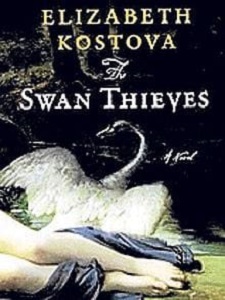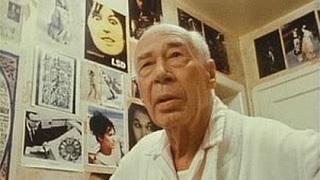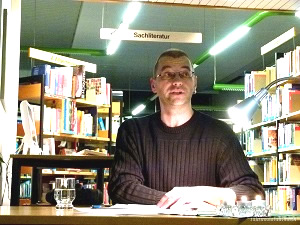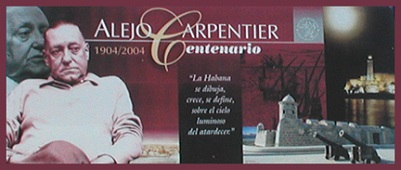De Amerikaanse schrijver David Sedaris werd geboren in Binghamton, New York, op 26 december 1956. Zie ook alle tags voor David Sedaris op dit blog.
Uit:When You Are Engulfed in Flames
“Carry my groceries upstairs.’ She sounded like a man, or, rather, a hit man, her voice coarse and low, like heavy footsteps on gravel.
‘Now?’ Hugh asked.
She said, ‘What? You got something better to do?’
I first saw the apartment a few days later. Hugh was in the living room taking down the panelling while I sat on a paint bucket and tried to come to terms with my disappointment. For starters, there was the kitchen floor. The tiles there were brown and tan and ochre, the colours seemingly crocheted as they would be on an afghan. Then there was the size. I was wondering how two people could possibly live in such a tight space, when there was a knock at the unlocked door, and this woman I didn’t know stepped uninvited onto the horrible tiles. Her hair was dyed the colour of a new penny, and she wore it pulled back into a thumb-sized ponytail. This put the focus on her taped-up glasses, and on her lower jaw, which stuck out slightly, like a drawer that hadn’t quite been closed. ‘Can I help you?’ I asked, and her hand went to a whistle that hung from a string around her neck.
‘Mess with me, and I’ll stick my foot so far up your ass I’ll lose my shoe.’
Someone says this, and you naturally look down, or at least I do. The woman’s feet were tiny, no longer than hot-dog buns. She had on puffy sneakers, cheap ones made of air and some sort of plastic, and, considering them, I frowned.
‘They might be small, but they’ll still do the job, don’t you worry,’ she said.
Right about then, Hugh stepped out of the living room with a scrap of panelling in his hand. ‘Have you met Helen?’ he asked.
The woman unfurled a few thick fingers, the way you might when working an equation: 2 young men + 1 bedroom – ugly panelling = fags. ‘Yeah, we met.’ Her voice was heavy with disdain. ‘We met, all right.’
Throughout the seven years Hugh and I lived on Thompson Street, our lives followed a simple pattern. He would get up early and leave the house no later than eight. I was working for a house-cleaning company, and though my schedule varied from day to day, I usually didn’t start until 10. My only real constant was Helen, who would watch Hugh leave the building, and then cross the hall to lean on our doorbell. I would wake up, and just as I was belting my robe, the ringing would be replaced by a pounding, frantic and relentless, the way you might rail against a coffin lid if you’d accidentally been buried alive.”

David Sedaris (Binghamton, 26 december 1956)
De Amerikaanse schrijfster Elizabeth Kostova werd geboren op 26 december 1964 in New London, Connecticut. Zie ook alle tags voor Elizabeth Kostova op dit blog.
Uit: The Swan Thieves
“I got the call about Robert Oliver in April 1999, less than a week after he’d pulled a knife in the nineteenth-century collection at the National Gallery. It was a Tuesday, one of those terrible mornings that sometimes come to the Washington area when spring has already been flowery and even hot — ruinous hail and heavy skies, with rumbles of thunder in the suddenly cold air. It was also, by coincidence, exactly a week after the massacre at Columbine High School in Littleton, Colorado; I was still thinking obsessively about that event, as I imagined every psychiatrist in the country must have been. My office seemed full of those young people with their sawed-off shotguns, their demonic resentment. How had we failed them and — even more — their innocent victims? The violent weather and the country’s gloom seemed to me fused that morning.
When my phone rang, the voice on the other end was that of a friend and colleague, Dr. John Garcia. John is a fine man — and a fine psychiatrist — with whom I went to school long ago and who takes me out for lunch now and then at the restaurant of his choice, seldom allowing me to pay. He does emergency intake and inpatient care in one of Washington’s biggest hospitals and, like me, also sees private patients.
John was telling me now that he wanted to transfer a patient to me, to put him in my care, and I could hear the eagerness in his voice. “This guy could be a difficult case. I don’t know what you’ll make of him, but I’d prefer for him to be under your care at Goldengrove. Apparently he’s an artist, a successful one — he got himself arrested last week, then brought to us. He doesn’t talk much and doesn’t like us much, here. His name is Robert Oliver.”
I’ve heard of him, but I don’t really know his work,” I admitted. “Landscapes and portraits — I think he was on the cover of ARTnews a couple of years ago. What did he do to get arrested?” I turned to the window and stood, watching hail fall like expensive white gravel over the walled back lawn and a battered magnolia. The grass was already very green, and for a second there was watery sunlight over everything, then a fresh burst of hail.
“He tried to attack a painting in the National Gallery. With a knife.”
“A painting? Not a person?”
“Well, apparently there was no one else in the room at that moment, but a guard came in and saw him lunging for a painting.”

Elizabeth Kostova (New London, 26 december 1964)
Cover
De Amerikaanse schrijver Henry Miller werd geboren op 26 december 1891 In New York. Zie ook alle tags voor Henry Miller op dit blog.
Uit: Sexus
“The great joy of the artist is to become aware of a higher order of things, to recognize by the compulsive and spontaneous manipulation of his own impulses the resemblance between human creation and what is called “divine” creation. …To be caught in a glut of dramatic episodes, to be ceaselessly participating, means among other things that one is unaware of the outlines of that bigger drama of which human activity is but a small part. …
To ask the purpose of the game, how it is related to life, is idle. As well ask the Creator why volcanoes? why hurricanes? since obviously they contribute nothing but disaster. But since disasters are disastrous only for those who are engulfed in them, whereas they can be illuminating for those who survive and study them, so it is in the creative world. The dreamer who returns from his voyage, if he is not shipwrecked en route, may and usually does convert the collapse of his tenuous fabric into other stuff. For a child the pricking of a bubble bay offer nothing but astonishment and delight. The student of illusions and mirages may react differently. A scientist may bring to a bubble the emotional wealth of a world of thought. The same phenomenon which causes the child to scream with delight may give birth, in the mind of an earnest experimenter, to a dazzling vision of truth. In the artist these contrasting reactions seem to combine or merge, producing that ultimate one, the great catalyzer called realization. Seeing, knowing, discovering, enjoying- these faculties or powers are pale and lifeless without realization. The artist’s game is to move over into reality. It is to see beyond the mere “disaster” which the picture of a lost battlefield renders to the naked eye. For, since the beginning of time the picture which the world has presented to the naked eye can hardly seem anything but a hideous battleground of lost causes. It has been so and will be so until man ceases to regard himself as the mere seat of conflict. Until he takes up the task of becoming the “I of his I.”

Henry Miller (26 december 1891 – 7 juni 1980)
De Duitse dichter Rainer Malkowski werd geboren op 26 december 1939 in Berlijn-Tempelhof. Zie ook alle tags voor Rainer Malkowski op dit blog.
Alles ist richtig
Das Kind sieht aus dem Zugfenster.
Zur Brücke sagt es Brücke.
Zum Schornstein sagt es Schornstein.
Manchmal sagt es einfach nur:
Da –
und stößt seinen Zeigefinger
gegen die Scheibe.
Und alles ist richtig.
Und die Adjektive in meinem Kopf
schämen sich
ihrer Entbehrlichkeit.
Die Frage
Alles Chemie.
Das Wachstum der Zellen,
ihr genaues, befristetes Leben:
alles Chemie.
Die Erfindung der Götter,
das Hohelied, das Radioteleskop:
alles Chemie.
Die Standhaftigkeit
des politischen Gefangenen,
das Glück und der Tastsinn,
freiwillige Armut,
die Rede des Chemikers
bei der Nobelpreisverleihung:
nichts als Chemie.
Nichts als Chemie
das kostbarste Erbgut:
die Frage.

Rainer Malkowski (26 december 1939 – 1 september 2003)
Berlijn, Kurfürstenamm in de kersttijd
De Duitse schrijver Mani Beckmann (pseudoniem Tom Finnek) werd geboren op 26 december 1965 in Alstätte/Westfalen. Zie ook alle tags voor Mani Beckmann op dit blog.
Uit: Sodom und Gomera
“Bist du sicher, dass das eine gute Idee ist?«
Ich grinste nickend und meinte: »Klar! Wer weiß, vielleicht finde ich ja sogar Spaß am Detektivspielen: Martin Brandt, ein Mann für alle Fälle. Außerdem war ich noch nie auf den kanarischen Inseln. Wird mal Zeit!«
Im Moment allerdings zweifelte ich daran, ein sonderlich guter Detektiv zu sein. Nicht einmal den Taxistand konnte ich ausfindig machen.
»Du Halbdackel«, hörte ich plötzlich eine piepsende Stimme hinter mir. »Wo haschden jetscht den Bruschtbeudel gelassen?« Ich drehte mich um, da ich dachte, ich sei gemeint, und sah ein etwa achtzehnjähriges, rothaariges Mädchen, das sich an dem Rucksack eines eingeschüchterten und gleichaltrigen Jungen zu schaffen machte. Schwaben, wie der Tonfall verriet. Und um zwei Jahrzehnte verspätete Blumenkinder, wie sich unschwer der Kleidung entnehmen ließ: Ledersandalen, bunte und geblümte beziehungsweise gestreifte Pluderhosen, Batikhemd und geflochtene Armbändchen. Das Mädchen hatte das Gesuchte gefunden und schnauzte ihren Freund an: »Du bisch echt ’n Grasdackel!«
»Wisst ihr, wie ich zum Hafen komme?«, fragte ich die beiden.
»Wo willschten hin?«, fragte das Mädchen.
»Zum Hafen.« Ich war mir beinahe sicher, es gerade erst gesagt zu haben.
»Noi, wo du hinwillscht?« Das Blumenkind strich sich die mittelgescheitelten und hennagefärbten Haare hinter die Ohren.
Ich bereute bereits, die beiden angesprochen zu haben.
Kommunikation mit Süddeutschen war immer so anstrengend, sie dachten so grundsätzlich anders als ich. Ich wiederholte also: »Los Cristianos.”

Mani Beckmann (Alstätte, 26 december 1965)
De Cubaanse schrijver, essayist en musicoloog Alejo Carpentier werd geboren in Havana op 26 december 1904. Zie ook alle tags voor Alejo Carpentier op dit blog.
Uit: The Kingdom of This World (Vertaald door Harriet de Onís)
“It had to be an American painter, the Cuban Wifredo Lam, who showed us the magic of tropical vegetation, the uncontrolled creativity of our natural formations–with all their metamorphoses and symbioses–on monumental canvases whose expression is unique in contemporary art.Faced with the disconcerting poverty of imagination of a Tanguy, for example, who for twenty-five years now has been painting the same petrified larvae under the same gray sky, I feel compelled to recite the dictum that was the pride of the first generation of Surrealists: Vous qui ne voyez pas, pensez a ceux qui voient.[You who don’t see, think about those who can.]
There are still too many “adolescents who take pleasure in raping the freshly murdered cadavers of beautiful women” (Lautreamont), who do not realize that it would be more marvelous to ravish them alive. It’s that so many people forget, because it costs them so little to dress up as magicians, that the marvelous begins to be marvelous in an unequivocal way when it arises from an unexpected alteration of reality (a miracle), from a privileged revelation of reality, from an unusual insight that is singularly favored by the unexpected richness of reality, or from an amplification of the scale and categories of reality, perceived with particular intensity by means of an exaltation of the spirit that leads it to a kind of “limit-state.”
In the first place, the phenomenon of the marvelous presupposes a faith. Those who do not believe in saints cannot be cured by the miracles of the saints, in the same way that those who are not Quixotes cannot enter, body and soul, into the world of Amadis of Gaul or Tirant lo Blanc. (18) Certain remarks by Rutilio in Cervantes’s Toils of Persiles and Sigismunda, about men being transformed into wolves, are prodigiously believable because in Cervantes’s day it was believed that there were people afflicted with lupine mania. The same applies to the character’s journey from Tuscany to Norway on a witch’s cape.”

Alejo Carpentier (26 december 1904 – 24 april 1980)
Affiche bij zijn 100e geboortedag
Zie voor nog meer schrijvers van de 26e december ook mijn vorige twee blogs van vandaag.
